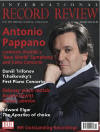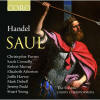Texte paru dans: / Appeared in:
*

International Record Review - (11/2012)
Pour
s'abonner / Subscription information
Coro
COR16103

0828021610325 (ID241)
Consultez toutes les évaluations recensées pour ce cd
~~~~ Reach all the evaluations located for this CD
... – Saul has fared exceptionnally well among Handel’s great dramatic oratorios, perhaps second only to Messiah, on disc. After Handel’s most popular work in the genre, Saul was the first I got to know thanks to the old Mackerras recording — pioneering at the time — which has inevitably been superseded over the years by period-instrument accounts from Gardiner, McCreesh and Jacobs, although I still treasure it for some of the solo singing: not Donald Mclntyre’s blustery Wagnerian Saul, perhaps, but for Sheila Armstrong’ s gentle-toned Michal, contrasting with the vehement brilliance of Margaret Price on the threshold of her international career. James Bowman’s David now sounds mannered and a tad prissy by the side of Andreas Scholl (McCreesh), Lawrence Zazzo (Jacobs) and now, most of all, Sarah Connolly on the new set, the first female singer to have recorded the role, I would guess, since Helen Watts on the old Vanguard set conducted by Mogens Wölddike with Jennifer Vyvyan and Thomas Hemsley.
This casting is, perhaps, the main reason, though not the only one, for acquiring the new set. It is based on the scholarship of the late Anthony Hicks, who believed that the role of David — like Cyrus in Belshazzar later — was conceived for a woman, Maria Antonia Marchesini, who had created Rosimonda in Faramondo and Arsamene (a trousers role) in Serse, in Handel’s 1737-38 season the one before the first performance of Saul in January 1739. According to Hicks’s researches, Marchesini’s name is written on the autograph to David’s solo in the chorus, ‘O fatal day’ , but she appears to have been indisposed on the day of the premiere and replaced by a singer called Russell, long assumed to have been a countertenor - this would have been the first time Handel had conceived such an important role for the male falsetto voice — but who was almost certainly an actor with a decent enough tenor voice to perform in ‘ballad operas’ such as The Beggar’s Opera. Hicks surmised that Russell must have sung the role an octave down.
For committed Handelians, this discovery alone, not to mention Connolly’s superlative singing, especially of the sublime “Lord, whose mercies numberless”, will be reason enough to acquire the set, which has all of the choral and orchestral virtues familiar from The Sixteen’s older Handel oratorio recordings. The choir - boosted to 18 with the addition of extra sopranos — makes a tremendous noise for the big, military choruses celebrating David’s victories and Saul’s majesty, but these expert Handelians are also light on their vocal ‘feet’ — no wonder Harry Christophers picks out individuals from their number — Mark Dobell, Jeremy Budd, Stuart Young, Eamonn Dougan, Ben Davies and Tom Raskin to sing, respectively, the bit parts of High Priest, Witch of Endur, Samuel’s Ghost, Abner, Doeg and Amalekite (Budd, mercifully, does not exaggerate the Witch’s witchy voice).
Christophers is, on the whole, a lively and mainstream Handelian, far removed from the exoticisms and eccentricities of Harnoncourt and Jacobs. To my surprise, he takes David’s great solo slower than Jacobs, but at more or less the same tempo as those of McCreesh and Mackerras, relishing the exquisite suspensions of the accompaniment without dragging or sounding over-indulgent. Connolly sustains it with a seamless legato, excellent diction and intense identification with the profound religious ecstasy Handel writes into this music. The set is worth having for her singing of this aria alone.
Christopher Purves’s volatile Saul strikes me, too, as a prime asset: although bigger and more beautiful voices have recorded the role, none of his colleagues in the older sets suggests the gradual slide into paranoia and derangement as Purves does here. His text is immaculate, his coluratura clean and precise, never blustery. Robert Murray sounds pleasing and stylish, if a little nondescript, as his friend Jonathan (an early John Beard role), but Saul’s son is the least vividly drawn of Handel’s characters in this oratorio.
If I am less enthralled by the rival, sparring sisters, Michal and Merab, it is because Joélle Harvey and Elizabeth Atherton sound too alike and their tune, sweet enough, turns steely under pressure. Neither makes much of the words, either, and you just have to listen to Price spitting out the text of ‘My soul rejects the thought’ with scorn while maintaining brilliantly focused tone to hear what is missing in Atherton’s musically rather bland performance. Harvey can sound lovely in ‘O, godlike youth’ and ‘In sweetest harmony they lived’ - sometimes at the expense of words but under pressure she becomes a brittle, metallic soubrette. I prefer a more sensuous sound.
Hardcore ‘authenticists ‘ will doubtless find Price et al too ‘operatic’ , but Handel conceived his story oratorios as dramas of the mind and he invariably cast opera singers in their leading roles. Price and Armstrong ( Mackerras), Emma Bell and Rosemary Joshua (Jacobs), Julia Varady and Elizabeth Gale ( Harnoncourt) sound not only completely contrasted in vocal character but they sing with more character (admittedly, Varady’s English leaves something to be desired, but her fiery temperament is incandescent!). Even so, Christophers’s Handel is always worth hearing and this issue is well up to the standards of previous releases in his series of oratorio recordings, with a well documented booklet, including a compelling essay by Ruth Smith.
This wouldn’t be my first preference - Gardiner is still hard
to beat, though his Saul, Alastair Miles, is a dull dog compared to Purves
but I will certainly return to it. Producer Mark Brown and engineer Mike
Hatch have done The Sixteen and friends proud at St Augustine‘s, Kilburn,
last January.
Fermer la fenêtre/Close window
Cliquez l'un ou l'autre
bouton pour découvrir bien d'autres critiques de CD
Click either button for many other reviews


